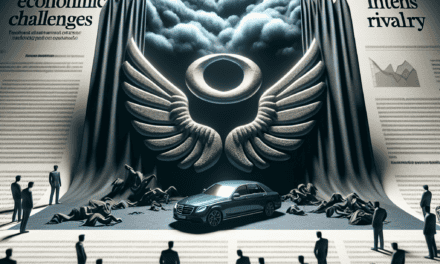“Buffett’s Billion-Dollar Beacon: Wall Street’s Wake-Up Call”
Introduction
Warren Buffett, the legendary investor and CEO of Berkshire Hathaway, has long been a guiding force in the financial world, known for his astute market insights and strategic acumen. Recently, his stark warning to Wall Street has grown increasingly urgent, as he highlights concerns over a staggering $166 billion. This alert underscores Buffett’s cautious stance on the current economic landscape, reflecting his deep-seated apprehensions about market valuations, potential economic downturns, and the broader implications for investors. As Wall Street grapples with these warnings, Buffett’s message serves as a critical reminder of the need for prudence and vigilance in navigating the complexities of today’s financial markets.
Understanding Warren Buffett’s $166 Billion Cash Reserve Strategy
Warren Buffett, the legendary investor and chairman of Berkshire Hathaway, has long been a figure of fascination and emulation on Wall Street. His investment strategies and market insights are closely scrutinized by investors worldwide. One of the most intriguing aspects of Buffett’s current strategy is his decision to maintain a substantial cash reserve, which has now reached a staggering $166 billion. This decision has sparked considerable debate and speculation among financial analysts and investors, prompting a closer examination of the rationale behind such a significant cash hoard.
To understand Buffett’s strategy, it is essential to consider his investment philosophy, which is deeply rooted in value investing. Buffett has always emphasized the importance of patience and discipline, advocating for investments in companies with strong fundamentals and long-term growth potential. His preference for holding cash is not a new phenomenon; rather, it is a reflection of his cautious approach to market conditions that he perceives as overvalued or uncertain. By maintaining a large cash reserve, Buffett positions Berkshire Hathaway to capitalize on opportunities that may arise during market downturns or periods of volatility.
Moreover, Buffett’s cash reserve strategy can be seen as a hedge against economic uncertainty. In recent years, global markets have experienced significant fluctuations due to geopolitical tensions, trade disputes, and the lingering effects of the COVID-19 pandemic. These factors have contributed to an environment of unpredictability, making it challenging for investors to identify reliable investment opportunities. By holding cash, Buffett ensures that Berkshire Hathaway remains agile and ready to deploy capital when attractive opportunities present themselves, without being constrained by existing investments.
In addition to serving as a buffer against market volatility, Buffett’s cash reserve strategy also reflects his cautious stance on current market valuations. Many analysts have raised concerns about the high valuations of stocks, particularly in the technology sector, which have been driven by low interest rates and an influx of retail investors. Buffett’s decision to hold cash suggests that he may be waiting for a market correction or a more favorable valuation environment before making significant investments. This approach aligns with his belief in buying quality assets at a reasonable price, rather than succumbing to the pressures of market exuberance.
Furthermore, Buffett’s cash reserve strategy underscores his commitment to maintaining financial flexibility. With a substantial cash reserve, Berkshire Hathaway is well-positioned to pursue strategic acquisitions or investments that align with its long-term objectives. This flexibility allows Buffett to act swiftly and decisively when opportunities arise, without the need to liquidate existing assets or incur additional debt. In this way, the cash reserve serves as a strategic tool that enhances Berkshire Hathaway’s ability to navigate an ever-changing economic landscape.
In conclusion, Warren Buffett’s $166 billion cash reserve strategy is a testament to his prudent and disciplined approach to investing. By holding a significant amount of cash, Buffett not only safeguards Berkshire Hathaway against market volatility and economic uncertainty but also positions the company to seize opportunities as they arise. His strategy reflects a deep understanding of market dynamics and a steadfast commitment to value investing principles. As Wall Street continues to grapple with the complexities of the modern financial landscape, Buffett’s cash reserve serves as a powerful reminder of the importance of patience, discipline, and financial flexibility in achieving long-term investment success.
The Implications of Warren Buffett’s Stark Warning for Wall Street
Warren Buffett, the legendary investor and CEO of Berkshire Hathaway, has long been a voice of reason and caution in the financial world. His recent warning, which has grown increasingly urgent, concerns the staggering $166 billion in cash reserves that Berkshire Hathaway has accumulated. This substantial sum, rather than being invested, sits idly, reflecting Buffett’s cautious stance on the current market environment. The implications of this decision are profound, as it signals a potential overvaluation in the market and serves as a stark alert to Wall Street.
Buffett’s decision to hold such a significant amount of cash is not without precedent. Historically, he has been known to accumulate cash when he perceives the market to be overvalued or when he cannot find investments that meet his stringent criteria for value. This approach underscores his investment philosophy of patience and prudence, emphasizing the importance of waiting for the right opportunities rather than succumbing to the pressure of deploying capital hastily. In this context, the $166 billion serves as a barometer of Buffett’s market outlook, suggesting that he sees limited opportunities for value in the current economic climate.
The implications of Buffett’s warning extend beyond Berkshire Hathaway’s investment strategy. For Wall Street, this accumulation of cash raises questions about the sustainability of current market valuations. With stock prices reaching new highs and economic indicators presenting mixed signals, Buffett’s cautionary stance suggests that investors should be wary of potential market corrections. His actions imply that the market may be overheated, and that a more conservative approach could be warranted in the face of potential volatility.
Moreover, Buffett’s alert highlights the broader economic uncertainties that continue to loom over the financial landscape. Factors such as geopolitical tensions, inflationary pressures, and the lingering effects of the COVID-19 pandemic contribute to an environment of unpredictability. In such a context, Buffett’s decision to hold cash can be seen as a hedge against these uncertainties, providing Berkshire Hathaway with the flexibility to capitalize on opportunities that may arise from market dislocations.
In addition to signaling caution, Buffett’s cash reserves also reflect his strategic foresight. By maintaining liquidity, he positions Berkshire Hathaway to act decisively when market conditions become more favorable. This approach not only aligns with his long-term investment strategy but also underscores the importance of adaptability in navigating complex financial landscapes. For investors, this serves as a reminder of the value of maintaining a balanced portfolio that can withstand market fluctuations.
As Wall Street grapples with the implications of Buffett’s warning, it is essential for investors to consider the lessons embedded in his approach. While the allure of immediate gains can be tempting, Buffett’s emphasis on patience and value investing offers a counterpoint to the often short-term focus of the market. By prioritizing sound fundamentals and exercising caution, investors can better navigate the challenges and opportunities that lie ahead.
In conclusion, Warren Buffett’s $166 billion alert serves as a powerful reminder of the importance of prudence in investing. As Wall Street continues to assess the implications of his warning, it is clear that his approach offers valuable insights into managing risk and capitalizing on opportunities in an uncertain market environment. Through his actions, Buffett not only reinforces his reputation as a sage investor but also provides a guiding light for those seeking to navigate the complexities of the financial world.
How Warren Buffett’s Investment Philosophy Influences His Cash Holdings
Warren Buffett, often regarded as one of the most successful investors of all time, has long been a figure of fascination and emulation on Wall Street. His investment philosophy, characterized by a focus on value investing, long-term growth, and a keen eye for quality businesses, has consistently delivered impressive returns. However, one aspect of Buffett’s strategy that has recently garnered significant attention is his substantial cash holdings, which have now reached a staggering $166 billion. This accumulation of cash serves as a stark alert to Wall Street, reflecting both his cautious approach to the current market environment and his readiness to seize opportunities when they arise.
Buffett’s investment philosophy is deeply rooted in the principles of value investing, a strategy that emphasizes buying undervalued stocks with strong fundamentals and holding them for the long term. This approach requires patience and discipline, as it often involves waiting for the right opportunities to present themselves. In this context, Buffett’s substantial cash reserves can be seen as a strategic move, allowing him to act swiftly and decisively when market conditions align with his investment criteria. By maintaining a significant cash position, Buffett ensures that he is not forced to sell existing holdings at inopportune times to fund new investments, thereby preserving the integrity of his portfolio.
Moreover, Buffett’s cash holdings reflect his cautious outlook on the current market environment. In recent years, the stock market has experienced significant volatility, driven by factors such as geopolitical tensions, economic uncertainty, and rapid technological changes. In such a climate, Buffett’s decision to hold a large amount of cash can be interpreted as a hedge against potential market downturns. This conservative approach underscores his belief in the importance of capital preservation, a core tenet of his investment philosophy. By prioritizing the protection of his capital, Buffett positions himself to weather market fluctuations and emerge stronger when conditions improve.
In addition to serving as a buffer against market volatility, Buffett’s cash reserves also provide him with the flexibility to capitalize on unique investment opportunities. Historically, Buffett has demonstrated a keen ability to identify and invest in undervalued companies during periods of market distress. His substantial cash holdings enable him to act quickly and decisively when such opportunities arise, often allowing him to negotiate favorable terms and secure attractive deals. This opportunistic approach has been a hallmark of Buffett’s investment strategy, contributing significantly to his long-term success.
Furthermore, Buffett’s emphasis on maintaining a strong cash position highlights his commitment to financial discipline and prudent risk management. By avoiding excessive leverage and ensuring ample liquidity, Buffett minimizes the risk of being caught off guard by unforeseen events or market disruptions. This conservative approach not only safeguards his investments but also instills confidence among his shareholders, who trust in his ability to navigate complex market dynamics.
In conclusion, Warren Buffett’s substantial cash holdings serve as a powerful testament to his investment philosophy, reflecting his cautious approach to the current market environment and his readiness to seize opportunities when they arise. By prioritizing capital preservation, maintaining financial discipline, and remaining vigilant for undervalued investments, Buffett continues to set a high standard for investors worldwide. As his $166 billion cash alert grows louder, it serves as a reminder of the enduring wisdom and foresight that have defined his illustrious career.
Analyzing the Market Conditions Behind Buffett’s $166 Billion Alert

Warren Buffett, the legendary investor and CEO of Berkshire Hathaway, has long been a voice of reason and caution in the financial world. His recent $166 billion alert to Wall Street has captured the attention of investors and analysts alike, prompting a closer examination of the market conditions that have led to this stark warning. As we delve into the factors contributing to Buffett’s cautionary stance, it becomes evident that a confluence of economic indicators and market dynamics is at play.
To begin with, the global economic landscape has been marked by significant volatility and uncertainty. The lingering effects of the COVID-19 pandemic continue to disrupt supply chains and labor markets, leading to inflationary pressures that have not been seen in decades. Central banks around the world, including the Federal Reserve, have responded with monetary tightening measures, such as interest rate hikes, to curb inflation. However, these actions have also raised concerns about potential slowdowns in economic growth, creating a delicate balancing act for policymakers.
In addition to macroeconomic challenges, the stock market itself has exhibited signs of frothiness. Valuations in certain sectors, particularly technology, have reached historically high levels, prompting fears of a potential bubble. The rapid rise of speculative investments, such as cryptocurrencies and meme stocks, has further fueled concerns about market exuberance. Buffett, known for his value investing philosophy, has often cautioned against such speculative behavior, emphasizing the importance of investing in fundamentally sound companies with strong long-term prospects.
Moreover, geopolitical tensions have added another layer of complexity to the market environment. Ongoing conflicts and trade disputes have the potential to disrupt global commerce and impact investor sentiment. The uncertainty surrounding these issues can lead to increased market volatility, as investors grapple with the potential implications for their portfolios. Buffett’s alert serves as a reminder of the importance of considering geopolitical risks when making investment decisions.
Furthermore, the rise of environmental, social, and governance (ESG) considerations has reshaped the investment landscape. Investors are increasingly prioritizing sustainability and ethical practices, leading to a shift in capital allocation. While this trend presents opportunities for companies that align with ESG principles, it also poses challenges for those that fail to adapt. Buffett’s emphasis on long-term value creation aligns with the growing recognition that sustainable business practices are integral to future success.
In light of these factors, Buffett’s $166 billion alert can be seen as a call for prudence and careful analysis. His substantial cash reserves reflect a cautious approach, allowing Berkshire Hathaway to capitalize on opportunities that may arise during periods of market dislocation. This strategy underscores the importance of maintaining a strong financial position and being prepared to act decisively when attractive investments become available.
As investors navigate the complexities of the current market environment, Buffett’s warning serves as a valuable reminder of the need for discipline and a long-term perspective. While short-term market fluctuations can be unsettling, a focus on fundamental analysis and sound investment principles can help mitigate risks and enhance returns over time. Ultimately, Buffett’s alert is not just a cautionary note, but also an invitation to reassess investment strategies and ensure they are aligned with the evolving economic and market conditions.
Lessons from Warren Buffett’s Cautious Approach to Market Volatility
Warren Buffett, the legendary investor and CEO of Berkshire Hathaway, has long been a voice of reason and caution in the often tumultuous world of Wall Street. His recent alert, highlighting a staggering $166 billion, serves as a stark reminder of the importance of prudence and foresight in navigating market volatility. This substantial sum, representing Berkshire Hathaway’s cash reserves, underscores Buffett’s cautious approach to investing, particularly in uncertain times. As Wall Street grapples with fluctuating markets and economic unpredictability, Buffett’s strategy offers valuable lessons for investors seeking to safeguard their portfolios.
One of the key takeaways from Buffett’s approach is the emphasis on maintaining a robust cash reserve. By holding a significant amount of cash, Buffett ensures that Berkshire Hathaway is well-positioned to capitalize on opportunities that arise during market downturns. This strategy not only provides a buffer against potential losses but also allows for strategic acquisitions when asset prices are more favorable. In essence, Buffett’s cash reserve acts as a financial safety net, enabling him to act decisively when others may be constrained by market conditions.
Moreover, Buffett’s cautious stance is a testament to his long-term investment philosophy. Rather than succumbing to the allure of short-term gains, he prioritizes sustainable growth and value creation. This perspective is particularly relevant in today’s market environment, where volatility can tempt investors to make impulsive decisions. By focusing on the intrinsic value of investments and maintaining a patient outlook, Buffett exemplifies the importance of discipline and strategic thinking in achieving financial success.
In addition to his emphasis on cash reserves and long-term thinking, Buffett’s approach highlights the significance of understanding market cycles. He is acutely aware that markets are inherently cyclical, characterized by periods of expansion and contraction. This awareness informs his investment decisions, allowing him to anticipate potential downturns and adjust his strategy accordingly. By recognizing the cyclical nature of markets, investors can better prepare for volatility and mitigate its impact on their portfolios.
Furthermore, Buffett’s alert serves as a reminder of the importance of diversification. While he is known for his concentrated investments in companies he deeply understands, he also recognizes the value of spreading risk across different asset classes. Diversification helps to cushion against market fluctuations, reducing the potential for significant losses. This principle is particularly pertinent in times of economic uncertainty, where the performance of individual sectors or companies can be unpredictable.
In conclusion, Warren Buffett’s $166 billion alert to Wall Street is a powerful illustration of the lessons that can be gleaned from his cautious approach to market volatility. By maintaining substantial cash reserves, prioritizing long-term value, understanding market cycles, and embracing diversification, Buffett provides a blueprint for navigating the complexities of investing. As Wall Street continues to face challenges and uncertainties, these principles offer a guiding light for investors seeking to protect and grow their wealth. Ultimately, Buffett’s enduring wisdom serves as a reminder that in the world of investing, patience, discipline, and strategic foresight are invaluable assets.
The Role of Economic Indicators in Buffett’s Investment Decisions
Warren Buffett, often referred to as the “Oracle of Omaha,” has long been a guiding force in the world of investing. His insights and strategies are closely watched by investors and analysts alike, and his recent alert regarding a $166 billion cash reserve has sent ripples through Wall Street. This substantial sum, held by his conglomerate Berkshire Hathaway, is not merely a testament to the company’s financial strength but also a reflection of Buffett’s cautious approach in the current economic climate. To understand the rationale behind this significant cash reserve, it is essential to delve into the economic indicators that influence Buffett’s investment decisions.
Economic indicators are critical tools that provide insights into the health and direction of an economy. They encompass a wide range of data, including employment figures, inflation rates, gross domestic product (GDP) growth, and consumer confidence indices. For Buffett, these indicators serve as a compass, guiding his investment strategies and decisions. In particular, he pays close attention to indicators that signal potential economic downturns or opportunities for growth. By analyzing these data points, Buffett can make informed decisions about when to deploy capital and when to hold back.
One of the key indicators that Buffett monitors is the interest rate environment. Interest rates have a profound impact on the economy, influencing borrowing costs, consumer spending, and business investment. In recent years, the global economy has experienced a prolonged period of low interest rates, which has fueled asset price inflation and increased market volatility. Buffett’s decision to maintain a large cash reserve can be seen as a strategic move to safeguard against potential market corrections that may arise from shifts in interest rates. By holding cash, he positions Berkshire Hathaway to capitalize on investment opportunities that may emerge during periods of market turbulence.
Moreover, Buffett is known for his focus on long-term value investing, a strategy that requires patience and a keen understanding of market cycles. Economic indicators such as GDP growth and corporate earnings reports provide valuable insights into the overall economic landscape and the performance of individual sectors. By analyzing these indicators, Buffett can identify industries and companies that are poised for sustainable growth. This approach allows him to make investments that align with his philosophy of buying undervalued assets with strong potential for appreciation over time.
In addition to traditional economic indicators, Buffett also considers geopolitical factors and global economic trends. The interconnectedness of today’s global economy means that events in one part of the world can have far-reaching implications. For instance, trade tensions, political instability, and changes in regulatory environments can all impact market dynamics. By staying attuned to these developments, Buffett can adjust his investment strategies to mitigate risks and seize opportunities that arise from global economic shifts.
In conclusion, Warren Buffett’s $166 billion alert to Wall Street underscores the importance of economic indicators in shaping his investment decisions. By carefully analyzing interest rates, GDP growth, corporate earnings, and geopolitical factors, Buffett is able to navigate the complexities of the financial markets with prudence and foresight. His approach serves as a reminder of the value of patience, discipline, and a deep understanding of economic fundamentals in achieving long-term investment success. As Wall Street continues to heed Buffett’s insights, his emphasis on economic indicators remains a cornerstone of his enduring legacy in the world of finance.
Future Market Predictions Based on Buffett’s Current Financial Strategy
Warren Buffett, the legendary investor and CEO of Berkshire Hathaway, has long been a beacon of wisdom for Wall Street and investors worldwide. His financial strategies and market predictions are closely scrutinized, often serving as a barometer for future market trends. Recently, Buffett’s actions have sent a stark $166 billion alert to Wall Street, signaling potential shifts in the financial landscape. This substantial sum, representing Berkshire Hathaway’s cash reserves, is not merely a testament to the company’s financial strength but also a strategic positioning that reflects Buffett’s cautious outlook on the current market environment.
Buffett’s decision to maintain such a significant cash reserve is not without reason. Historically, he has advocated for holding cash as a strategic asset, particularly during times of market uncertainty. This approach allows for flexibility and the ability to capitalize on opportunities when valuations become attractive. In the current economic climate, characterized by volatile markets, geopolitical tensions, and rising interest rates, Buffett’s strategy underscores a prudent approach to risk management. By holding onto cash, he positions Berkshire Hathaway to weather potential downturns and seize opportunities that may arise from market dislocations.
Moreover, Buffett’s cautious stance is further evidenced by his selective investment choices. While he has made some notable acquisitions, such as his increased stake in Occidental Petroleum, these moves are calculated and reflect a focus on sectors with long-term growth potential. This selective approach suggests that Buffett is wary of overvalued markets and is waiting for more favorable conditions before deploying his substantial cash reserves more aggressively. His investment philosophy, rooted in value investing, emphasizes the importance of intrinsic value and margin of safety, principles that guide his decision-making process even in uncertain times.
In addition to his investment strategy, Buffett’s recent comments provide further insight into his market outlook. He has expressed concerns about inflationary pressures and their impact on the economy. Rising inflation can erode purchasing power and lead to higher interest rates, which in turn can affect corporate profits and stock valuations. Buffett’s awareness of these macroeconomic factors highlights his comprehensive approach to assessing market conditions and reinforces his cautious stance.
Furthermore, Buffett’s actions and insights serve as a reminder of the importance of patience and discipline in investing. In an era where short-term gains often dominate market narratives, his long-term perspective offers a counterbalance. By maintaining a substantial cash reserve, Buffett exemplifies the virtue of waiting for the right opportunities rather than succumbing to the pressures of immediate market trends. This disciplined approach not only safeguards against potential losses but also positions investors to benefit from future market corrections.
In conclusion, Warren Buffett’s $166 billion alert to Wall Street is a reflection of his strategic foresight and cautious optimism. His decision to hold significant cash reserves, coupled with his selective investment choices and awareness of macroeconomic challenges, underscores a prudent approach to navigating the current market environment. As investors look to the future, Buffett’s actions and insights provide valuable lessons in risk management, patience, and the importance of maintaining a long-term perspective. In a world of uncertainty, his financial strategy serves as a guiding light, reminding investors of the enduring principles that underpin successful investing.
Q&A
1. **What is Warren Buffett’s Stark $166 Billion Alert?**
– Warren Buffett’s alert refers to his significant cash reserves, indicating caution and a lack of attractive investment opportunities.
2. **Why is Buffett holding $166 billion in cash?**
– Buffett is holding cash due to high market valuations and a lack of undervalued investment opportunities.
3. **What does this cash reserve signal to Wall Street?**
– It signals potential market overvaluation and Buffett’s cautious approach to investing in the current environment.
4. **How does Buffett’s cash position compare historically?**
– This is one of the largest cash positions Berkshire Hathaway has held, reflecting heightened caution.
5. **What impact does Buffett’s alert have on investors?**
– It may prompt investors to reassess market conditions and consider the possibility of a market correction.
6. **Has Buffett made any significant investments recently?**
– Buffett has been relatively inactive in making large acquisitions, focusing instead on smaller investments and stock buybacks.
7. **What might trigger Buffett to deploy this cash?**
– A significant market correction or the emergence of undervalued opportunities could prompt Buffett to invest the cash reserves.
Conclusion
Warren Buffett’s stark $166 billion alert to Wall Street underscores his cautious approach amid market volatility and economic uncertainty. By amassing a substantial cash reserve, Buffett signals potential overvaluation in the market and prepares for future investment opportunities. This strategy reflects his prudent investment philosophy, emphasizing patience and readiness to capitalize on market corrections. As Wall Street grapples with fluctuating conditions, Buffett’s alert serves as a reminder of the importance of strategic foresight and disciplined financial management.





